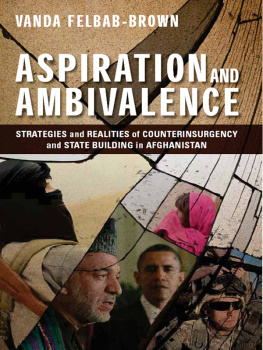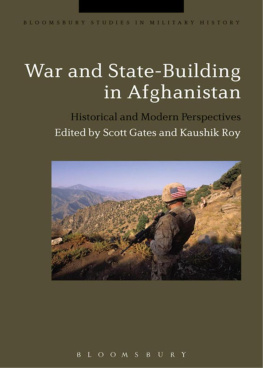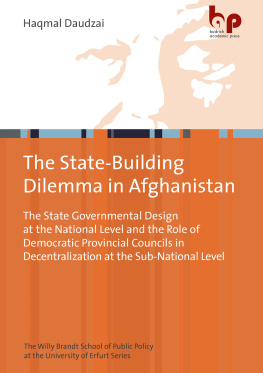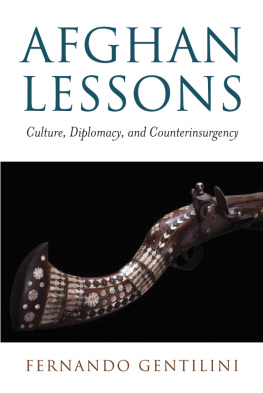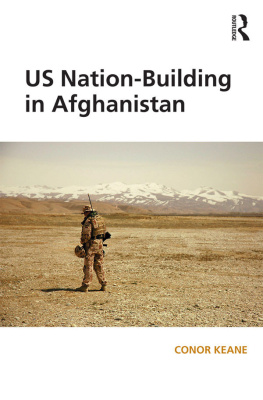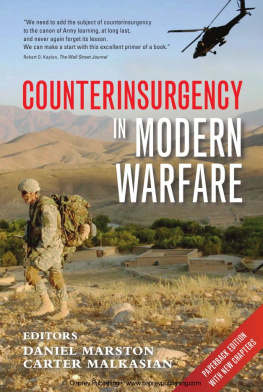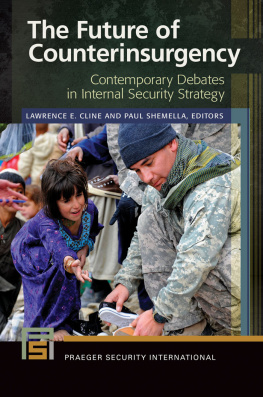After more than a decade of great effort and sacrifice by America and its allies, the Taliban still has not been defeated, and many Afghans believe that a civil war is coming. Aspiration and Ambivalence analyzes the U.S. and international efforts in Afghanistan and offers detailed recommendations for dealing with the precarious situation leading up to the 2014 transition to Afghan control and beyond.
Vanda Felbab-Brown argues that allied efforts in Afghanistan have put far too little emphasis on good governance, concentrating too much on short-term military goals to the detriment of long-term peace and stability. The Western tendency to ally with bullies, warlords, smugglers, and other shady characters in pursuit of short-term military advantage actually empowers the forces working against good governance and long-term political stability. Rampant corruption and mafia rule thus persist, making it impossible for Afghans to believe in the institutional reforms and rule of law that are clearly necessary. This must changeotherwise, the chances of building responsive and sustainable governmental structures are slim, indeed.
Felbab-Brown combines thorough research and analysis with vivid personal accounts of her time spent in the war-torn nationpowerful vignettes illustrating the Afghan aspirations for peace, stability, and sovereignty and the stubborn obstacles to securing them.
The year 2014 will mark a critical juncture in Afghanistan's odyssey. After more than a decade of arduous fighting and political involvement, the U.S. and international presence there will be significantly reduced and circumscribed. Although the international community has committed itself not to abandon Afghanistan as it did in the 1990s, the onus will be on the Afghan government to provide for the security of the country, its economic development, and governance that attempts to meet the needs of the Afghan people. Difficult challenges, major unresolved questions, and worrisome trends surround all three sets of processes. The biggest hole in the U.S. strategy and international efforts to stabilize the country is the failure to adequately address the country's fractured and brittle political system and very poor governance.
from Aspiration and Ambivalence
VANDA FELBAB-BROWN is a senior fellow with the 21st Century Defense Initiative and the Latin America Initiative in Foreign Policy at the Brookings Institution. A frequent commentator on international conflict management, counterinsurgency, organized crime, and illicit economies, she is the author of Shooting Up: Counterinsurgency and the War on Drugs(Brookings, 2009).
JACKET BY SESE-PAUL DESIGN
PHOTOGRAPH OF OBAMA WITH KARZAI REUTERS/JIM YOUNG
ALL OTHER IMAGES ISTOCKIMAGES.COM
ASPIRATION AND AMBIVALENCE
STRATEGIES and REALITIES of COUNTERINSURGENCY and STATE BUILDING in AFGHANISTAN
Vanda Felbab-Brown
BROOKINGS INSTITUTION PRESS
Washington, D.C.
Copyright 2013
THE BROOKINGS INSTITUTION
1775 Massachusetts Avenue, N.W., Washington, D.C. 20036
www.brookings.edu
All rights reserved. No part of this publication may be reproduced or transmitted in any form or by any means without permission in writing from the Brookings Institution Press.
Library of Congress Cataloging-in-Publication data are available
ISBN: 978-0-8157-2441-4 (hardcover : alk. paper)
9 8 7 6 5 4 3 2 1
Printed on acid-free paper.
Typeset in Sabon
Composition by Cynthia Stock
Silver Spring, Maryland
Printed by R. R. Donnelley
Harrisonburg, Virginia
To those who have struggled to make Afghanistan a more peaceful and prosperous country
Foreword
Bruce Riedel
The United States has been at war in Afghanistan off and on since January 1980, when the first shipment of U.S. arms arrived in Karachi, en route to the mujahideen, less than two weeks after the Soviet Union invaded Afghanistan. At first it was a covert war, fought only by a small number of CIA officers, but after the terrorist attacks of 9/11 the war came out of the shadows and American boots arrived on the ground. Twice in the last quarter-century the United States has squandered great victories achieved in Afghanistan by failing to follow up battlefield success with an enduring commitment to help build a stable government in the country and provide the resources necessary to do so. Both times the cost to the United States of taking its eye off the ball in Afghanistan was high. It is imperative not to make the same mistake a third time, or most likely the outcome will again be costly.
In the late 1980s, after the most effective covert operation in the nation's history, American-supported Afghan mujahideen defeated the Soviet 40th Red Army; following that, the Berlin Wall fell, Eastern Europe was liberated, and the Soviet Union itself collapsed. The mujahideen, however, were badly divided, and Afghanistan quickly fell into civil war. The United States could have led an international effort to restore order and rally key players like Pakistan and Saudi Arabia to try to end the conflict. Instead, Afghanistan got virtually no attention from the White House or from Congress. By the late 1990s the radical Taliban movement, with the help of Pakistan, which felt abandoned and had lost faith in America, had taken power in most of Afghanistan and was hosting the even more radical al Qaeda terrorist group, which attacked America, first in 1998, then again in 2000, and most painfully on September 11, 2001.
In late 2001 the CIA led a campaign to topple the Taliban with the support of the Northern Alliance, the Taliban's foe inside Afghanistan. Again the results, which came very quickly, were spectacular. By early 2002 the Taliban were routed, al Qaeda was on the run, and both were retreating to Pakistan. Al Qaeda probably would have been destroyed and an Afghan state created that could exercise control over the Pashtun belt, where the Taliban are strongest, if a concerted international effort to do so had been made in 2002 and 2003. Instead, American resources and attention shifted to Iraq and the Afghans got marginal support from the United States. By 2006 the Taliban had come back with a vengeance, again with Pakistani help. Once again, American resources surged toward Iraq. By the end of 2008, the increasingly confident Taliban controlled much of the rural countryside in the southern part of the country, where Pashtuns are a majority. Meanwhile, the Taliban and al Qaeda's leaders were hiding out comfortably in Pakistan. President Barack Obama inherited a disaster in Afghanistan.
Americans' reasons for being tired of the war in Afghanistan are understandable. The mission is expensive and difficult, and far too many people have died or been wounded in pursuing it. But the majority of the problems that the United States faces in Afghanistan are the result of its own errors, not the strategic genius of its foes. Vanda Felbab-Brown, my colleague at Brookings, has written a brilliant new book that explains those mistakes and errors in depth and offers recommendations for how America can still get it right.
Vanda's book is based in large part on considerable field research inside Afghanistan. She has traveled extensively around the country, sometimes with the NATO forces in country but more often on her own. The result is a unique collection of insights based on firsthand experience. These insights, drawn from close observation and tough questioning, are backed up by her years of research on the problems of failing states and drug cultures. She is critical of U.S. failures but hopeful that the United States can still make them right, for both itself and Afghanistan. This book is not only good research and analysisit is a sparkling good read.


